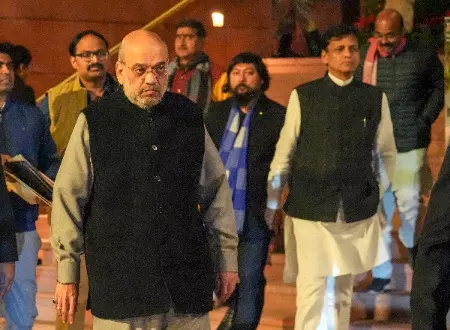India's internal security challenges to remain dynamic due to its neighbourhood: Amit Shah

New Delhi: Union Home Minister Amit Shah has said the country's internal security challenges would remain dynamic in view of India's geo-political neighbourhood.
Delivering the concluding address at the eighth National Security Strategies Conference (NSSC) here on Saturday, Shah said, demonstrating strong political will, Prime Minister Narendra Modi has once again not only reaffirmed the policy of zero tolerance against terrorism, but also presented it before the world in a remarkable manner through Operation Sindoor.
"Observing that the internal security challenges would remain dynamic in view of India's geo-political neighbourhood, Shah exhorted the state police forces and Central security agencies to adopt the motto of 'Suraksha, Sajagta and Samanvay' (security, alertness and coordination)," an official statement said.
Stating that the Modi government has resolved numerous issues scattered across various states, Shah said, "India is one of the fastest emerging economies, and with that, the challenges before the country are also increasing. We must stay more vigilant and tackle problems with heightened awareness."
He also called the NSSC significant in enabling senior officers to guide young officers, familiarise them with challenges, and show them the path to finding solutions.
The home minister said the forces of all states and central investigating agencies should move forward to become the best in the world.
To address the challenges facing the nation, a reliable ecosystem for real-time data sharing must be established, he said.
Shah also said that all agencies must make a security-first approach, habitual alertness, and coordination an integral part of their working methodology.
He mentioned that the prime minister's strong resolve and the support of fellow citizens sent a strong message of zero tolerance towards terrorism across the world.
Pointing out that India's economy has risen to the fourth position globally, the home minister said India is now a world leader in new and emerging technologies, startups, green energy and innovations.
He also emphasised that India's rising stature would lead to increasing national security challenges in the years to come.
Stressing that these challenges needed to be tackled through better coordination, Shah called for the formation of homogeneous teams of central and state agencies to develop strategies, and implement and monitor them.
He also instructed the involvement of young police officers in each state to brainstorm on national challenges and devise solutions to address them.
Shah urged to inculcate the use of national databases like NATGRID, NIDAAN, iMoT and CBI's fugitive database among young officers by including them in all training programmes.
The home minister emphasised that the next five to ten years would be very important for the development and security of the country.
While appreciating the achievements in Left Wing Extremism (LWE), northeast and Jammu and Kashmir theatres, he asked the DGPs to adopt a similar approach for effective implementation of the three new criminal laws and tackling the challenge of narcotics.
He also advocated the need for a top-to-bottom and bottom-to-top approach in initiating action against the big drug cartels, besides focusing on the extradition of narco-offenders.
The DGPs were directed to make it the prime agenda of the police for the next three years in the path towards 'Nasha Mukt Bharat', the statement said.
Pointing out that the police station is the focal point of intelligence collection, he called upon the police leadership to evolve a credible platform for sharing real-time information up to the police station level.
Emphasising the primary duty of the police to protect the life, property and dignity of citizens, the home minister directed each state police force and central agency to strive towards excellence, and nurture a spirit of healthy competition to address the internal security challenges.
Stressing the need for all-round development in the LWE-affected areas, Shah urged the DGPs to coordinate with state administrations to ensure the implementation of more than 300 central and state development schemes at the grassroots level.
Underscoring the importance of securing smaller seaports along the country's maritime borders, Shah emphasised the capacity building of state police to counter infiltration and smuggling activities.
He also reviewed the counter-terror initiatives and directed that stringent legal action be taken against repeat offenders.
Earlier, he paid homage to the martyrs on the occasion of Kargil Vijay Diwas and saluted the efforts of the armed forces and the BSF during Operation Sindoor.



